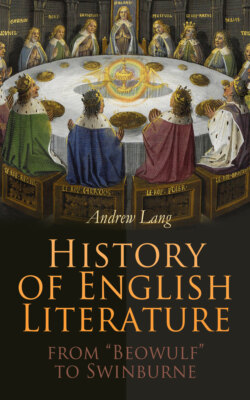Читать книгу History of English Literature from "Beowulf" to Swinburne - Andrew Lang, Robert Kirk - Страница 36
На сайте Литреса книга снята с продажи.
Ormulum.
ОглавлениеLayamon was too great a poet to mingle sermons with his song. The pulpit was his preaching place, he scarcely ever preaches in his poem. On the other hand the worthy brother Ormin or Orm did nothing but preach in his versified book "The Ormulum". He was an Augustinian canon of the North Midlands who, about 1200, paraphrased the Gospels read on each day, and the homily which followed, often drawn from Bede (for Orm was not an advanced theologian), in a kind of blank verse. Nothing could be more simply edifying to plain congregations, but edification is not the aim of literature. Orm is best known for his determination to have English properly pronounced. A vowel, in English is, and was, sounded short before two consonants, and Orm was bent on making the reader pronounce the vowels thus and not otherwise. He therefore wrote the two consonants after every short vowel, and explained himself thus, the lines also give the metre of his verses:—
And whase wilenn shall thiss hoc
Efft others sithe writenn
Him bidde Icc thatt het write rihht
Swa summ thiss hoc him teachethh....
And tatt he loke wel thatt he
An bocstaff write twiyess
Eyywhaer thaes itt upo thiss boc
Iss written o thatt wise.
By using some Scots words we may translate this in the original metre.
And whasae willen shall this book
Another time be writing
Him do I bid that he write richt
Even as this book him teacheth.
And that he do look well that he
Ane letter writeth twice
Aye there where it upon this book
Is written in that wise.
The metre is very like that of the Scottish rhymed version of the Psalms, though Orm (as in the second verse above) only uses rhyme by accident. The "Ormulum" is not to be "read for human pleasure," though it is interesting to students of the language and versification while in a state of transition.
The same may be said of a number of works in prose or verse which are to be found by students in editions published by learned societies. It is necessary to say something of them, because it is a kind of duty to be aware of their existence, though few but specialists can be enthusiastic over their merits, save in one or two cases. They show how the language and the modes of versifying were going forward, and becoming such as a great poet like Chaucer could improve; or, on the other hand; language and verse were going backwards, deserting rhyme and depending (as in Anglo-Saxon) on alliteration, or alliteration mixed with rhyme.
